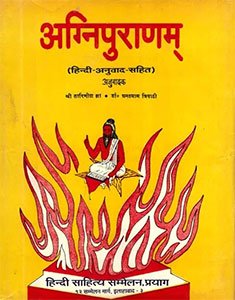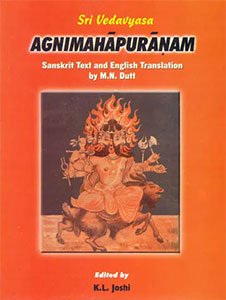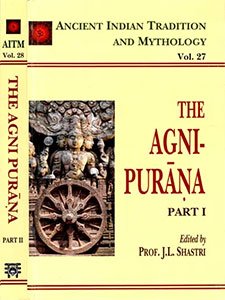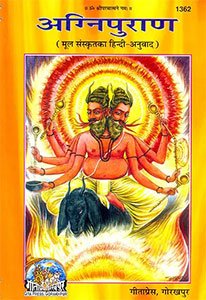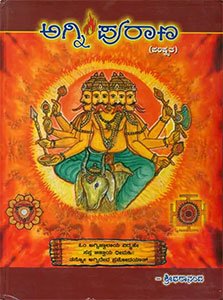Agni Purana [sanskrit]
97,288 words
This Sanskrit edition of the Agnipurana. It is one of the traditional eighteen Mahapuranas presented as an encyclopedia of ancient Indian history and knowledge. It contains either 382 or 383 chapters and over 10.000 verses (Sanskrit Shlokas).
Verse 42.25
नैर्ऋत्यां रामकं वायौ वामनं वासुदेवकम् ।
ईशे प्रासादरचना देया वस्वर्ककादिभिः ।
द्वारस्य चाष्टमाद्यंशं त्यक्त्वा वेधो न दोषभाक् ॥ २५ ॥
nairṛtyāṃ rāmakaṃ vāyau vāmanaṃ vāsudevakam |
īśe prāsādaracanā deyā vasvarkakādibhiḥ |
dvārasya cāṣṭamādyaṃśaṃ tyaktvā vedho na doṣabhāk || 25 ||
The Sanskrit text of Verse 42.25 is contained in the book The Agni Puranam (Anandashram Edition) by Shri Chimna Apate (श्री चिमणा आपटे). This book is available online or you could buy the latest edition:
Read online Buy now! The Sanskrit text by Shri Chimna Apate (श्री चिमणा आपटे) (1987)
Glossary of Sanskrit terms
Note: This extracts Sanskrit terms and links to English definitions from the glossary, based on an experimental segmentation of verse (42.25). Some terms could be superfluous while some might not be mentioned. Click on the word to show English definitions.
Nairriti, Nairritya, Ramaka, Vaya, Vayu, Vamana, Vasudevaka, Isha, Ish, Prasada, Racana, Deya, Vasu, Ric, Aka, Dvara, Adya, Sha, Vedha, Vedhas, Doshabhaj,
Analysis of Sanskrit grammar
Note: this is an experimental feature and only shows the first possible analysis of the Sanskrit text (Verse 42.25). If the system was successful in segmenting the sentence, you will see of which words it is made up of, generally consisting of Nouns, Pronouns, Verbs, Participles and Indeclinables. Click on the link to show all possible derivations of the word.
- Line 1: “nairṛtyāṃ rāmakaṃ vāyau vāmanaṃ vāsudevakam ”
- nairṛtyām -
-
nairṛtī (noun, feminine)[locative single]nairṛtyā (noun, feminine)[accusative single]
- rāmakam -
-
rāmaka (noun, masculine)[adverb], [accusative single]rāmaka (noun, neuter)[adverb], [nominative single], [accusative single]rāmakā (noun, feminine)[adverb]
- vāyau -
-
vāya (noun, masculine)[nominative dual], [vocative dual], [accusative dual]vāyu (noun, masculine)[locative single]vāyu (noun, feminine)[locative single]
- vāmanam -
-
vāmana (noun, masculine)[adverb], [accusative single]vāmana (noun, neuter)[adverb], [nominative single], [accusative single]vāmanā (noun, feminine)[adverb]
- vāsudevakam -
-
vāsudevaka (noun, masculine)[adverb], [accusative single]
- Line 2: “īśe prāsādaracanā deyā vasvarkakādibhiḥ ”
- īśe -
-
īśa (noun, masculine)[locative single]īśa (noun, neuter)[nominative dual], [vocative dual], [accusative dual], [locative single]īśā (noun, feminine)[nominative dual], [vocative single], [vocative dual], [accusative dual]īś (noun, masculine)[dative single]√īś (verb class 2)[present middle first single], [perfect middle first single], [perfect middle third single]
- prāsāda -
-
prāsāda (noun, masculine)[compound], [vocative single]
- racanā* -
-
racanā (noun, feminine)[nominative plural], [vocative plural], [accusative plural]
- deyā* -
-
deya (noun, masculine)[nominative plural], [vocative plural]deyā (noun, feminine)[nominative plural], [vocative plural], [accusative plural]√dā (verb class 1)[benedictive active second single]√dā (verb class 3)[benedictive active second single]
- vasvar -
-
vasu (noun, feminine)[instrumental single]
- ṛk -
-
ṛc (noun, feminine)[compound], [adverb], [nominative single], [vocative single]
- akād -
-
aka (noun, neuter)[adverb], [ablative single]
- ibhiḥ -
-
i (noun, masculine)[instrumental plural]
- Line 3: “dvārasya cāṣṭamādyaṃśaṃ tyaktvā vedho na doṣabhāk ”
- dvārasya -
-
dvāra (noun, masculine)[genitive single]dvāra (noun, neuter)[genitive single]
- cāṣ -
-
ca (noun, masculine)[nominative plural], [vocative plural]cā (noun, feminine)[nominative plural], [vocative plural], [accusative plural]
- ṭam -
-
ṭa (noun, masculine)[adverb], [accusative single]ṭa (noun, neuter)[adverb], [nominative single], [accusative single]ṭā (noun, feminine)[adverb]
- ādyaṃ -
-
ādya (noun, masculine)[adverb], [accusative single]ādya (noun, neuter)[adverb], [nominative single], [accusative single]ādyā (noun, feminine)[adverb]√ad -> ādya (participle, masculine)[adverb from √ad]√ad -> ādya (participle, neuter)[adverb from √ad]√ad -> ādyā (participle, feminine)[adverb from √ad]√ad -> ādya (participle, masculine)[accusative single from √ad]√ad -> ādya (participle, neuter)[nominative single from √ad], [accusative single from √ad]
- śam -
-
śa (noun, masculine)[adverb], [accusative single]śa (noun, neuter)[adverb], [nominative single], [accusative single]
- tyaktvā -
-
√tyaj -> tyaktvā (absolutive)[absolutive from √tyaj]
- vedho* -
-
vedhas (noun, masculine)[compound], [vocative single]vedhas (noun, neuter)[compound], [nominative single], [vocative single], [accusative single]vedha (noun, masculine)[nominative single]
- na -
-
na (indeclinable particle)[indeclinable particle]na (noun, masculine)[compound], [vocative single]na (noun, neuter)[compound], [vocative single]
- doṣabhāk -
-
doṣabhāj (noun, masculine)[compound], [adverb], [nominative single], [vocative single]doṣabhāj (noun, neuter)[compound], [adverb], [nominative single], [vocative single], [accusative single]
Other editions:
Also see the following editions of the Sanskrit text or (alternative) English translations of the Verse 42.25
Agni Purana with Hindi Translation
by Tarinish Jha and Dr. Ghanshayam Tripathi (तारिणीश् झा और डॉ. घनश्याम त्रिपाठी) (2007)
Publisher: Hindi Sahitya Sammelan, Allahabad; 1199 pages; Title: अग्निपुराणम् (संस्कृत एवं हिन्दी अनुवाद);
Buy now!
Agni Purana (Two Volumes)
by M. N. Dutt (2023)
Publisher: Parimal Publication Pvt. Ltd.; Editor: K. L. Joshi.; ISBN-10: 8171101690; ISBN-13: 9788171101696; 1070 pages.
Buy now!
Agni-Purana (Set of 4 Volumes)
by N. Gangadharan (2006)
Publisher: Motilal Banarsidass Publishers Pvt. Ltd.; ISBN: Part I 8120803590 (9788120803596); Part II 8120803604 (9788120803602); Part III 8120801741 (9788120801745); Part IV 812080306X (9788120803060); 1271 pages.
Buy now!
The Agni Purana (Hindi)
by (2013)
Publisher: Gita Press, Gorakhpur; Title: अग्निपुराण (केवल हिन्दी अनुवाद); ISBN-10: 8129302934; ISBN-13: 9788129302939; 848 pages.
Buy now!
Agni Purana (Kannada)
by Sreedharananda (2013)
Publisher: Pooja Pusthaka Bhandara, Bangalore; Title: ಅಗ್ನಿ ಪುರಾಣ; 560 pages.
Buy now!Preview of verse 42.25 in Kannada sript:
ನೈರೃತ್ಯಾಂ ರಾಮಕಂ ವಾಯೌ ವಾಮನಂ ವಾಸುದೇವಕಮ್ ।
ಈಶೇ ಪ್ರಾಸಾದರಚನಾ ದೇಯಾ ವಸ್ವರ್ಕಕಾದಿಭಿಃ ।
ದ್ವಾರಸ್ಯ ಚಾಷ್ಟಮಾದ್ಯಂಶಂ ತ್ಯಕ್ತ್ವಾ ವೇಧೋ ನ ದೋಷಭಾಕ್ ॥ ೨೫ ॥
![Agni Purana [sanskrit] - book cover](/uploads/a/Agni-Purana-Sanskrit.jpg)
